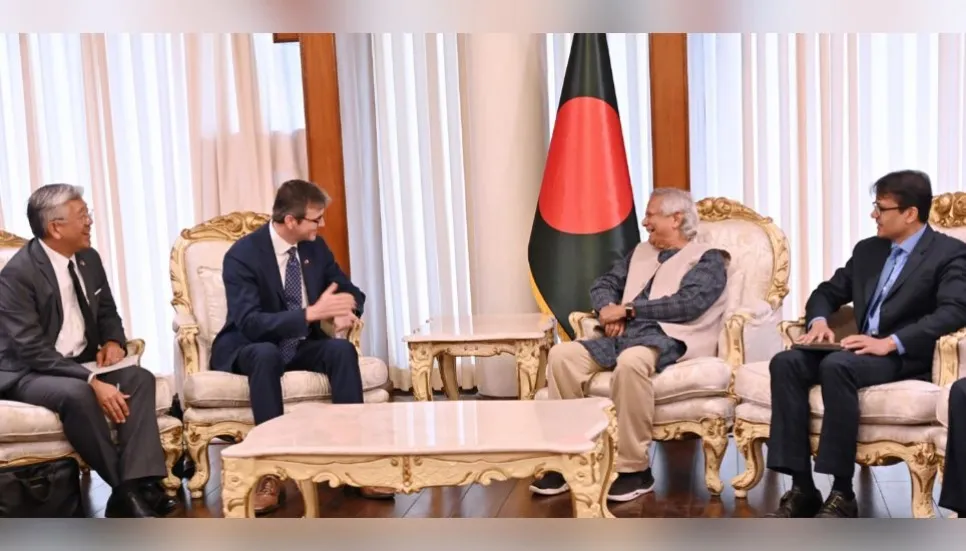
On Sunday, Chief Adviser Prof Muhammad Yunus sought support from the United States to rebuild the country, carry out vital reforms, and bring back stolen assets, stressing that it is a very important time for Bangladesh and a significant moment in its history.
The 2006 Nobel Peace Prize winner described the challenges facing the interim government to the visiting US delegation, saying his administration has moved quickly to "reset, reform, and restart" the economy, initiate reforms in financial sectors, and fix institutions such as the judiciary and police.
The Chief Adviser sought the assistance when a high-powered US delegation met him at the state guesthouse Jamuna.
The US side affirmed its dedication to fostering inclusive economic growth, institution building, and development to benefit the people of Bangladesh.
“As Bangladesh looks to chart a more equitable and inclusive future, the US stands ready to support those efforts,” said the US side after the meeting held at state guesthouse Jamuna.
The Chief Adviser spoke about the student-led revolution, which has ushered in a new era of hope in Bangladesh, according to the Chief Adviser’s press wing.
Assistant Secretary for International Finance at the US Department of the Treasury Brent Neiman, US Assistant Secretary of State for the Bureau of South and Central Asian Affairs Donald Lu, Assistant US Trade Representative Brendan Lynch, Deputy Assistant Administrator Anjali Kaur and Director of the US Treasury Department Jerrod Mason represented the US in the meeting.
Principal Coordinator on SDGs Affairs Lamiya Morshed, Chief Adviser's Special Envoy on International Affairs Lutfey Siddiqi, Foreign Secretary Md Jashim Uddin and Secretary of the Economic Relations Division Md Shahriar Kader Siddiky also attended the meeting, among others.
The Chief Adviser described an outline of the reform initiatives undertaken by the Interim Government.
He said six commissions had been set up barely weeks after his government took over to prevent vote rigging, reform the judiciary, police, civil administration, the country's anti-graft agency, and amend the constitution.
Prof Yunus said his government was committed to getting back the stolen assets siphoned off by corrupt individuals linked with the previous autocratic regime.
"We were in an ocean of corruption," the chief adviser said while describing the challenges the government faces to tackle graft.
US delegation leader Brent Nieman praised Professor Yunus's leadership and said Washington DC would be happy to support his reform agenda.
US officials have said they were eager to offer technical and financial assistance for reforms being carried out by the Interim Government.
During the hour-long talks, financial and economic reforms, investment, labour issues, the Rohingya crisis, and the chief adviser's upcoming visit to New York for the UN General Assembly were also discussed.
Graffiti: Dr Yunus requests US delegation to look at walls of Dhaka
Chief Adviser Professor Muhammad Yunus on Sunday presented an art book on graffiti of Bangladesh to the visiting US delegation after they met him at the State Guesthouse Jamuna.
The book carries photos of some of the finest art works drawn during the student-led revolution in July-August by students and young people on the walls of Dhaka and other cities and towns.
"I will request you to look at the walls of Dhaka. These graffiti still exist. They were drawn not just after the revolution. Students defied the government forces to draw graffiti during the protests in July," the chief adviser told US delegates.
The chief adviser commissioned the art book immediately after he was sworn in as the head of the interim government, said the chief adviser’s press wing.
Prof Yunus spoke about the historic significance of the graffiti, which depicted emotions, hope, and aspirations of the students and youth who participated in the protests against the “fascist” Sheikh Hasina regime defying brute forces.
Dhaka became the Graffiti Capital after young painters turned its walls into powerful canvases. They wrote slogans and poetry to deliver powerful messages.
The messages reflect the spirit of the revolution and the aspirations for a discrimination-free Bangladesh.
The chief adviser recalled how students used their artworks to deliver messages with the support of people from all walks of life. “They did not have the money to buy paint and brushes. People came forward to support them,” he told US delegates.